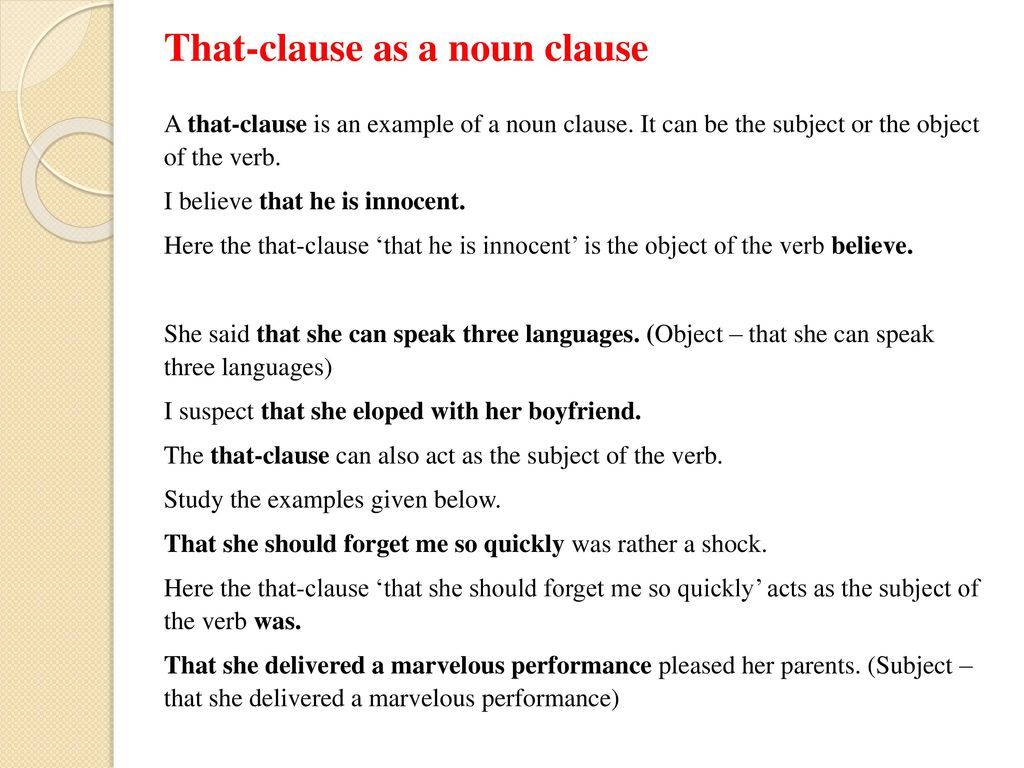Example Of Noun Clause - Noun Clause Definition Functions And Examples Of Noun Clauses 7esl - Noun clause example as indirect object:. In this posting i talk about how to form and correctly use noun clauses. For example, the following italicized noun clauses function as subject complements That she did not pass the exam is obvious at this point. Noun clause with if or whether. The most common word among them is that.
Whether he's passed exam is still unknown. They are noun clauses, adjective clauses, and adverbial clauses. If you've watched the hunger games: I saw how the accidenthappened. Like all clauses, a noun clause contains a subject (sometimes represented by one of the words above) and a predicate (a verb and any additional information attached to it).

• try the free mathway calculator and problem solver below to practice various math topics.
That she did not pass the exam is obvious at this point. I know that the storyis true. Noun clauses replace nouns, and this tutorial shows how. A noun clause functions as a noun, which means it can be a subject, direct object, indirect object, object of a preposition, predicate nominative, or appositive. We use who, what, which, whose, whoever, whatever, when, where, why, whether, how and that in noun clauses. What, whatever, whenever, when, where, which, whichever the chair = noun (noun phrase) object of the preposition on. noun clause: Noun clause with if or whether. The noun clause is a clause that functions like a noun in the sentence. Remember that a noun names a person, place, thing, or idea. A noun clause is that contains a finite verb and functioning like a noun within a sentences. What you have said makes her sad. The examples below show how they are used noun clauses often use words such as when, what, why, who and other question words, but the speaker may or may not be making a question. There are a lot of ways that you can communicate and one of it is writing.
It is important to think about why she behaved like that. A noun clause starts with a conjunction like that, what, who, which, how, why, whom, whose, when, where, whether, whenever, wherever, whichever, if … example: (the bold part is a dependent clause. Noun clauses can play the role of an adjective complement. What you have said makes her sad.

Need help understanding is a noun clause and what isn't?
In this posting i talk about how to form and correctly use noun clauses. • try the free mathway calculator and problem solver below to practice various math topics. It is important to think about why she behaved like that. Below we'll look at some examples of various noun clauses performing the different functions of a noun In the example the great thing about my kids is they all get along, that for example, if the sentence asks do you know what time we are leaving? the noun clause is what time we are leaving? you can't easily substitute. What, whatever, whenever, when, where, which, whichever the chair = noun (noun phrase) object of the preposition on. noun clause: A noun clause is a dependent clause that contains a subject and a verb. Noun clause with if or whether. Like all clauses, a noun clause contains a subject (sometimes represented by one of the words above) and a predicate (a verb and any additional information attached to it). Noun clause example as indirect object: Noun clauses replace nouns, and this tutorial shows how. Noun clauses describe something about the verb or the sentence. A noun clause can be the subject or object of the verb in the main clause.
That she did not pass the exam is obvious at this point. It might be a noun clause. What she did was to let out a scream. Another example is given below. Could you tell me whether she can help us.

A noun clause is a dependent clause that acts as a noun.
A noun clause is a clause that plays the role of a noun in a sentence. In each example, the noun clause is shaded, the subject of the clause is bold, and the verb of the noun clause is underlined. Whether he's passed exam is still unknown. The download at the end will give you additional practice using noun clauses. The two forms of noun clauses in the english language are finite noun clauses and nonfinite noun clauses. Another example is given below. A noun clause is a clause that works as a noun in a sentence. Here are some easy examples of noun clauses. A noun clause starts with a conjunction like that, what, who, which, how, why, whom, whose, when, where, whether, whenever, wherever, whichever, if … example: A noun clause with an implied that is a bit trickier, but you can do the same test. A noun clause is that contains a finite verb and functioning like a noun within a sentences. Noun clauses consist of a clause preceded by a subordinating conjunction. Noun clause example as indirect object:
